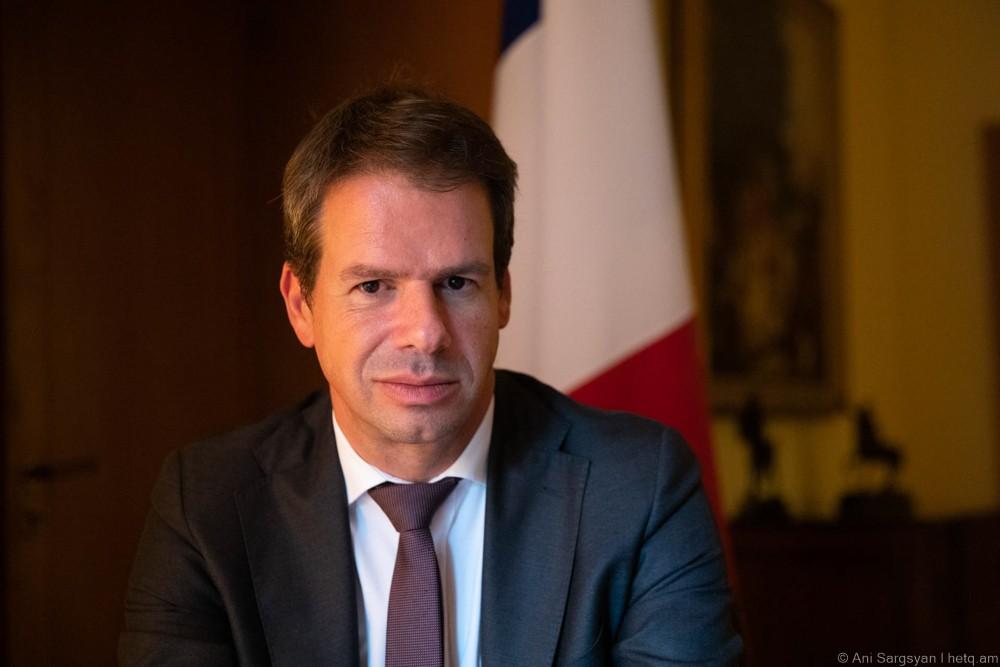
Outgoing French Ambassador to Armenia Jonathan Lacôte: “2.5 million united and determined people can work miracles”
French Ambassador to Armenia Jonathan Lacôte is wrapping up his diplomatic mission in the country. Before saying goodbye, Hetq spoke with Lacôte about the Artsakh issue, Armenian-French relations, and his experience in Armenia.
September 2 marked the 30th anniversary of Artsakh's declaration of independence. For three decades, the people of Artsakh have been fighting for self-determination, for their right to live on that land. In your last interview, you said that France is a country that fights for the right of its inhabitants to stay on their land. What is France's position on Artsakh?
We must state that months after the 44-day war, the Karabakh issue remains open. The war did not provide any solution. The war showed that there is an existential threat to the Armenians living in Karabakh. We live in the 21st century, and in the 21st century we cannot accept that people cannot live in their own home. We cannot accept that they will face problems such as war or deportation. The goal should be to resume negotiations and ensure the security of the people of Karabakh. The November 9 statement is a big step forward, as it has provided an opportunity for a ceasefire, but the status issue is open. France's priority is to create conditions for the resumption of negotiations between Armenia and Azerbaijan. The role of the Minsk Group is more important today than in the past. Our mission is to protect the people of Karabakh.
Azerbaijan considers the Karabakh issue resolved and emphasizes that the Minsk Group has been ineffective for thirty years. Do the Co-Chairs have leverage over Azerbaijan? Is it possible to restore the activity of the Minsk Group?
The reality is that only the Minsk Group has a mandate to discuss the status of Karabakh. We can hope that the conflict has been resolved, but the issue of the security of the people living there has not been resolved. No other international organization is represented there except the International Committee of the Red Cross. Only the Lachin corridor allows for a connection between Armenia and Karabakh. We have a blockaded population in that area. All this once again proves the need to resume negotiations. The Co-Chairs have repeatedly spoken about this after the November 9 statement, emphasizing that this need is due not only to the situation in the Nagorno-Karabakh conflict, but also to several events following that statement.
Azerbaijan isn’t returning Armenian POWs, is not fulfilling its obligations under the trilateral statement. At the same time, the United States, France and Russia are talking about regional cooperation and unblocking of transport routes. Can such a thing happen given this backdrop?
We are deadlocked over some issues. We are deadlocked on the issue of prisoners, on the issue of communication channels. No discussion, no negotiations are underway on the Karabakh issue. We see that this status quo is dangerous. After the November 9 announcement, we faced other problems, particularly in the territory of Armenia, on the Armenia-Azerbaijan border. The priority is the resumption of talks between Yerevan and Baku under the Minsk Group co-chairmanship. The conflicting parties must decide for themselves the priority issues that they will discuss.
Is there any progress in this regard?
I think we are coming to a point where each of the parties is interested in resuming negotiations. In any case, there have been statements from Armenia at the level of the Prime Minister and Foreign Minister, which we have welcomed.
Do you see the same tendency on the part of Baku?
I am not the French Ambassador to Azerbaijan.
You said that the role of France is to prevent a new conflict and to accompany Armenia in the political process of peace. But we see that the two countries, Azerbaijan and Armenia, are acquiring new weapons. There’s the belief that they are preparing for a new war. What can you say about this?
I think one would be naive to think that there is no risk of conflict in this region, that a new conflict is not possible. However, our role should not be to prepare the parties or to support any party in case of a new conflict, but to do everything to avoid a new conflict.
Is there superpower competition in the Caucasus?
Cooperation between Russia, the United States and France provides a great opportunity for the South Caucasus. The difficulties that exist in the relations between Russia and the West do not exist in the case of the Karabakh issue. Presidents Macron and Putin often have telephone conversations on several controversial issues, but there is a common ground on the Karabakh issue.
The use of Turkish drones was crucial in the outcome of the Artsakh war. Many of the parts of the Bayraktar UAVs are supplied by American, Canadian and European companies, including French ones. Some of them reviewed their supply contracts to Turkey after the war. Is France doing the same?
France is one of the few countries that imposed an embargo on Turkey in 2019 after Syria's actions.
You have repeatedly stressed the importance of protecting the Armenian cultural and spiritual heritage in the lost territories of Artsakh. The visit of the UNESCO mission is considered a mechanism, but Azerbaijan hasn’t permitted any such mission. Is there progress in this direction?
Immediately after the signing of the November 9 statement, the protection of the cultural and spiritual heritage in Nagorno-Karabakh and surrounding areas has been one of our priorities, especially because the issue is not mentioned in the tripartite statement. Of course, the protection of that heritage is carried out not by one, but by several UNESCO missions. These missions must be able to visit places that are under threat. UNESCO is a separate body, but Armenia and France have established bilateral cooperation in the preservation of cultural heritage to enable Armenia to inventory its heritage, while at the same time organizing training courses for the preservers. We hereby certify that the cultural heritage of Armenia is a part of the universal heritage, so that this time everything is done better than in 2006, when the Armenian stone crosses were destroyed in Julfa, and better than during the first Karabakh war. This applies to all heritages. The peculiarity of the Armenian cultural heritage is that often they are small elements in the form of fragile stone crosses and inscriptions. The preservation of that heritage is not only its physical existence, but the preservation of identity. We must be very vigilant so that there is no revaluation of that heritage in the political context.
We must hope that the UNESCO mission will visit Karabakh as soon as possible.
You are completing your diplomatic mission in Armenia. Can you summarize what progress was registered in Armenian-French relations during your tenure and what open questions remain? In what spheres does such cooperation need to be improved?
Regardless of my mission in Armenia, now, French-Armenian relations are at their highest level, but they have great potential for development. In recent years, we have strengthened our cooperation on educational programs. We have a new French school, which has both Armenian and French departments. We have developed the French University, which has five faculties, including computer science and applied mathematics. Armenia is one of the few countries in the world where France can provide an educational program from kindergarten to postgraduate. At the same time, we wanted to develop the teaching of French in Armenian educational institutions. When I arrived, there were only four schools in Armenia where French was taught in depth. Today, we have 18 schools, and they cover the entire geographical area of Armenia: Gyumri, Vanadzor, Ijevan, Etchmiadzin, Yeghegnadzor, Goris, Spitak. This year we started the implementation of that program in high schools thanks to an agreement signed with the Ministry of Education and Science a week ago. However, there are areas that the ambassador to replace me will work on, such as the opening of the French Institute at the Aznavour Center and the move of the French University to a new building. Naturally, each ambassador comes with his own thoughts, programs, and of course, there will be new areas of cooperation.
Do you see the benefits of France's contribution to the education system, results in the social and political life of Armenia?
Of course. We see it through the students of the French University, whose graduates hold positions in various enterprises and administrative structures.
You are very popular on social networks. With your notes and photos, you often publicize the culture and architecture of Armenia. You are considered a true friend of Armenia. Do social media help you in diplomacy? Do emotions have a place in diplomacy?
Of course, it stems from the duality of social networks. I act as an individual on social networks, but at the same time I am an ambassador. I present my findings there. At the same time, I use those platforms to send special messages. When there were clashes in Yeraskh in July, I discovered that many were awake at three at night. I wanted to tell those people that I am in the same situation, that when the situation escalates 60 km away from Yerevan, people in Yerevan cannot sleep. I have lived in Armenia and with Armenians for four years. The role of the ambassador is to reflect to the authorities and the society of his country the reality of the country where he lives. In that post, many saw support for Armenia. But my goal was to represent France and make France live up to the expectations of the Armenian society.
How did you see Armenia when you first arrived in 2017, and what is it like now that you are leaving?
When I arrived in Armenia in 2017, the first people I met left a surprised impression on me. They said that one should not have any expectations in the political sphere, but a few months later the revolution took place. These four years have been very rich. There have been happy events, such as the revolution and the Francophonie summit, as well as tragic events, such as the epidemic, which heavily impacted Armenia and left the impression that Armenia was more besieged, and, of course, the war. It is always a pleasure for me to remember 2018, which I call a happy year for Armenia. It is important for Armenians to remember that they are not doomed to misery. There have been happy times. There have been periods of national unity. There have also been years of great success.
You speak many languages. You also started studying Armenian in Armenia. Where are you going to use the Armenian language after leaving the post of ambassador?
I have not made significant progress during these four years. But what I know, I would like to preserve and develop, simply because Armenia is not a country that one leaves for good. I would like to preserve everything I learned during my stay in Armenia.
France is sending a woman to replace you. In Armenia’s patriarchal society, where there are few women in parliament and government, will it be easy for a woman ambassador to operate?
Armenians should get used to working with a female ambassador. Each ambassador comes with his or her own ideas and experience. Each new ambassador is a new opportunity for bilateral relations. The question should be not a woman or a man ambassador, but what experience and projects the person brings.
Is there anything in Armenia that you will miss?
Before leaving, I am becoming more and more convinced that I will not leave Armenia for good, that I will return as an individual. I do not say goodbye to people but see you. Because when you leave a country, you miss people, and nothing prevents you from seeing the people you know again.
Officially, you could not visit Artsakh. When you finish your diplomatic mission, will you visit as an ordinary French citizen? Do you have such a wish?
I would especially like to visit a peaceful Karabakh. A Karabakh whose population lives in safety and where my visit will not be political manipulated.
What's your parting wish for the Armenian people?
First, I would like to wish that all Armenians be confident in their strength. 2.5 million united and determined people can work miracles. Everything should not be expected from the outside. At the same time, everything should not be expected from the government. You must rely on yourselves and preserve national unity. Armenia is going to celebrate the 30th anniversary of its independence, I think we should pass the exam of those thirty years and try to draft an agenda for the next thirty.
Photos by Ani Sargsyan
 Videos
Videos Photos
Photos
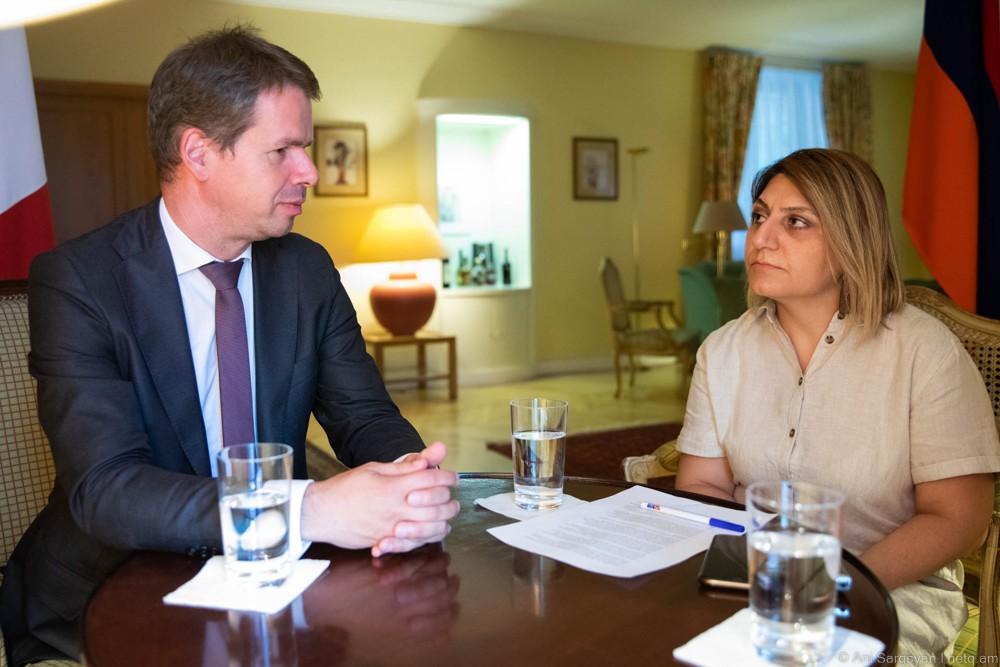
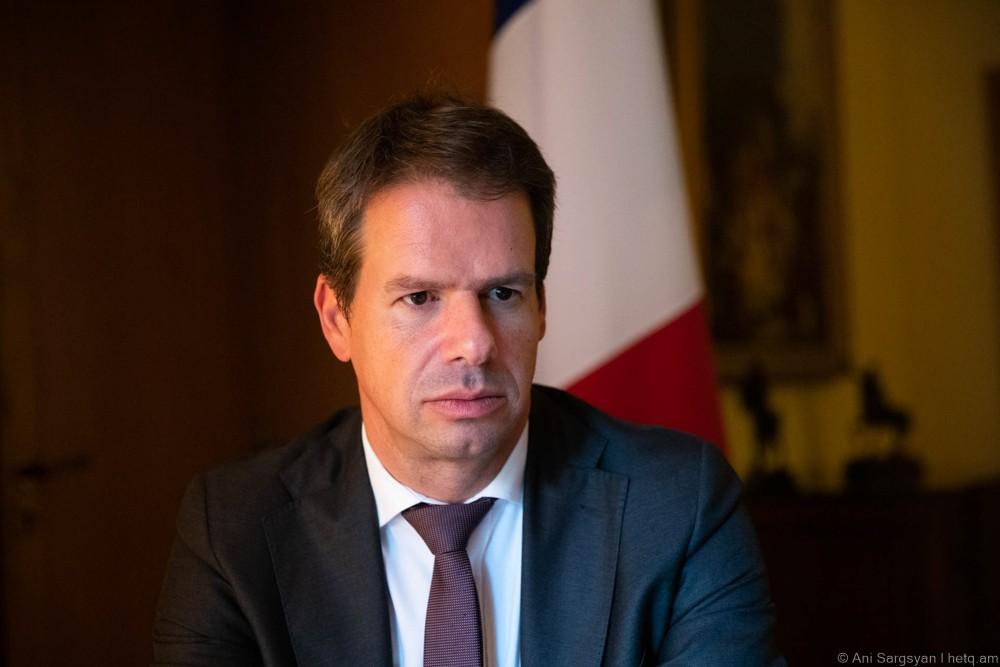
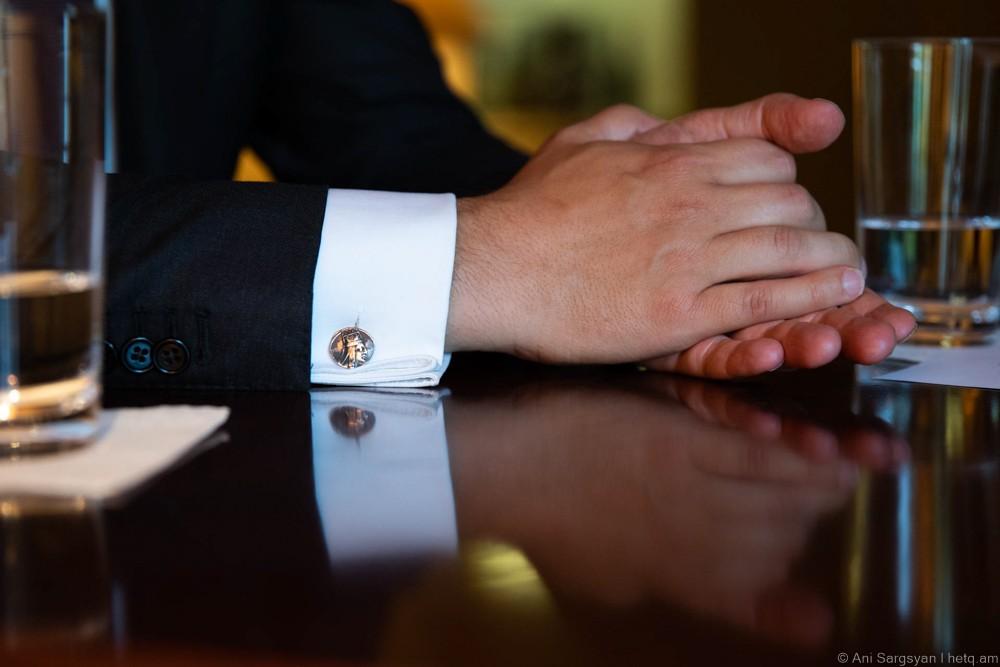
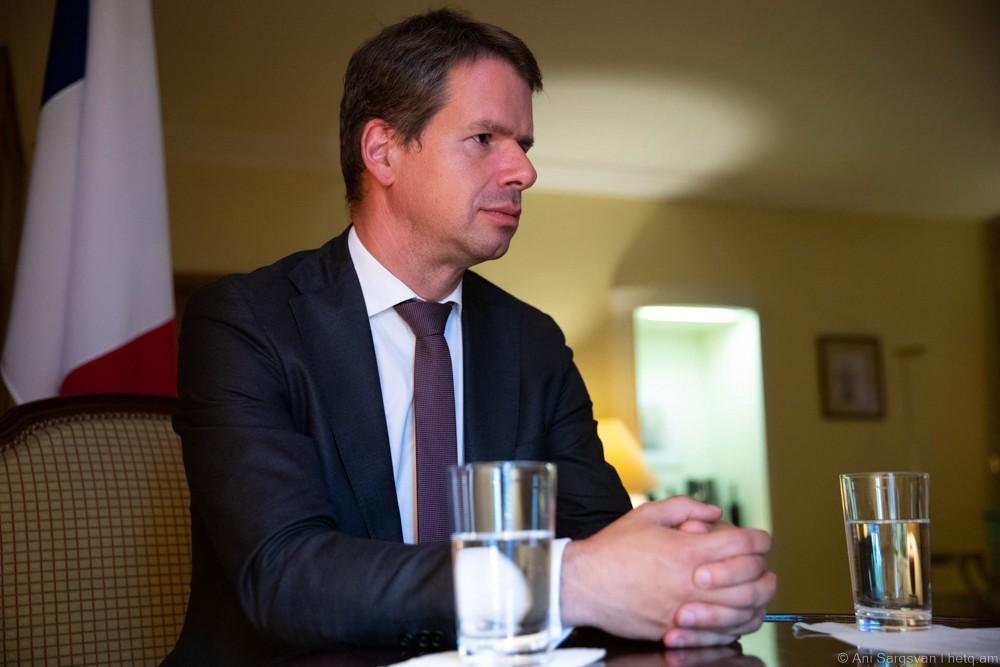
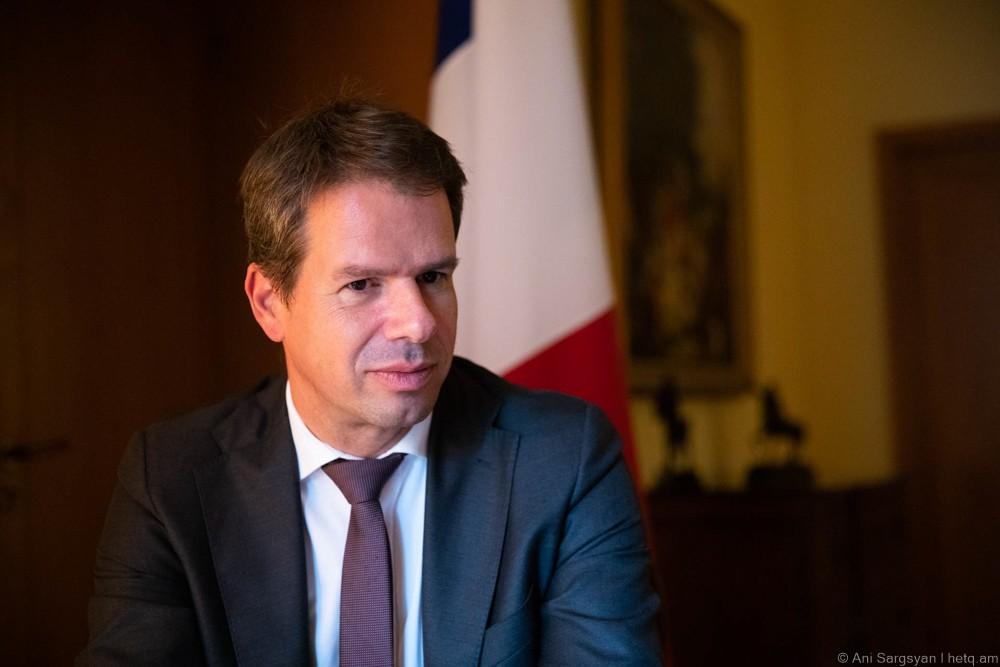
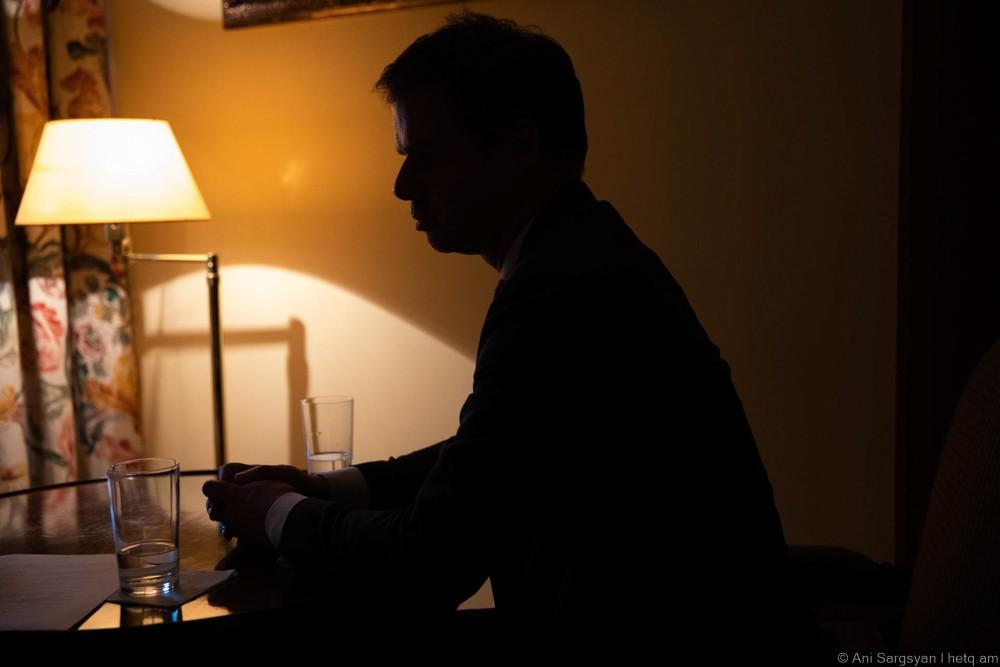
Comments (1)
Write a comment